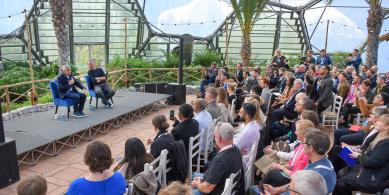I have – deep breath here – three children, a husband, a career, a house or two, a cat, a horse, a camper van, three cars, a gardener and a cleaner, plus a plethora of nieces, nephews, godchildren, friends and other extended family. I insist on making elaborate cakes, cooking Sunday lunch for the masses and collecting fruit to make jam and chutneys. I have kept and slaughtered pigs to prove my rural credentials, and attended parents’ evenings, PTA events and sports days, cheating with the best of them to win the egg and spoon race. I work out three times a week, remember birthdays, try to read all the Booker nominees and have my eyelashes ‘done’ every few weeks.
To the casual observer – or, perhaps, anyone that isn’t me – I appear organized, ‘on it’ and someone who doesn’t fail.
Because we can have it all, can’t we? We can juggle, dance, side-step and make it all happen – all while boasting a smile, great lashes, perfect kids, manicured nails and no wrinkles.
The younger women – and men – starting out look to senior people like myself (and many of you reading this) as role models, and see all of this as manageable, achievable and even easy. Just like someone’s Instagram feed, the image we portray professionally is one with no angst or imperfection – with no outward signs of tripping over and bloodying a knee.
Except it isn’t.
It’s actually chaos, lack of sleep, strained relationships, anxiety and pain – and frequently getting things wrong and failing big time. It can be upsetting, and it’s downright hard. It’s also about messing up, often. And asking for help – to pull together a pitch deck, or write a proposal, or mend a hem, or make a working, 3D volcano for the school project. But, as we try and avoid letting the mask slip, people rarely, if ever, see any of this stuff.
What are we actually doing to the young women and men coming up through the ranks (and, come to that, ourselves) by presenting a false perspective which is genuinely unachievable? Are we not, by setting unrealistic expectations, saying that failure is not acceptable, weakness is not acceptable, and that showing vulnerability or even asking for help is a no-go; something to be kept hidden?
Failure is good. Imperfection healthy. We learn from getting things wrong and are by default braver by doing so. Asking for helps creates teams and trust, builds knowledge, draws on experience beyond our own and creates a culture of collaboration and partnership. You’ll have read that before. But here’s the rub: knowing it’s hard and ‘messy’ and imperfect makes people lean in and support – as well as fostering a culture whereby others asking for that same support is second nature, not frowned upon. Because here’s a universal truth: we all need support – both personally and professionally – every now and then, and some more often than others.
If we, as role models, can lift the lid on the metaphorical ‘retouched image’ of our lives and encourage people to ask for help and admit flaws, we can create an environment where the leaders of 20 years’ time are more resilient, more prepared, happier and healthier. And, ultimately, better at their jobs. It may well be the best and most enduring thing we can pass down to the next generation.
This piece was by Tracey Barber. Follow her @BaTracey
Newsletter
Enjoy this? Get more.
Our monthly newsletter, The Edit, curates the very best of our latest content including articles, podcasts, video.
Become a member
Not a member yet?
Now it's time for you and your team to get involved. Get access to world-class events, exclusive publications, professional development, partner discounts and the chance to grow your network.




